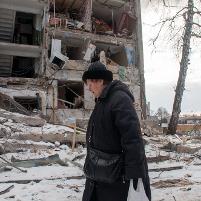In the last few weeks, we have witnessed the unfolding of the assault on Ukraine with extreme scenes seen all over the media, where we are shocked by the news and situations reported, without knowing what to do and where all this will end.
According to news from Help Age International, more than two million older adults in eastern Ukraine are at extreme risk, given the country's situation. Their report highlights that one in three people who need help are over 60 years of age. The news highlights that many older people face difficulties escaping the conflicts, a deep state of shortage of provisions and resources, lack of access to health care, and lack of support. Often unable to flee the country due to mobility issues or being emotionally bound to their homes, they can be left behind without support from loved ones or provisions. Subterfuge is sought in subway stations or basements, and thus they remain isolated and precluded to leave because of their physical condition. The institution's brief report on the older adults in the country is worrying with high rates of need for food, drinking water, electricity, gas, and hygiene kits.
Many older people refuse to flee the country and stay to provide food and help their companions survive, as is the case with the charity Age Concern Ukraine, headed by Galina Poliakova, which continues to operate in the country. With over 1,500 volunteers, all aged 60 and over, they keep delivering food and medical supplies while phoning their companions to help somehow.
The Guardian also reported on a group of older male runners who head to Kyiv every day, even as Russian bombs fall around them. The group emphasises that they want to show that they are alive. It's not just about running, a mere physical exercise, but also about running errands and shopping for people with less mobility in their neighbourhoods.
On the other hand, other older adults seem to find themselves having to enlist in the army to help the country somehow. Recently, an image of an elderly man allegedly enlisting in the Ukrainian military “for his grandchildren”, shared on social media by former Ukrainian first lady Kateryna Yushchenko, has gained much attention. Older adults are also willing to enlist, volunteering to fight or help in any way possible.
Some managed the feat of fleeing the country, as reported by a case of an 80-year-old grandmother who completed a 7-hour walk to escape the fighting. She crossed the Hungarian border with her daughter and 14-year-old granddaughter, despite being initially reluctant to leave her home. Help Age emphasises that whether older refugees stay in their new place of refuge, they need support.
A brief survey on the needs of older refugees in Moldova carried out by HelpAge pointed out that they need cash, food, medication, and hygiene kits, as all these resources will eventually wear out. In addition, the journey they had to face to escape must be considered, which indeed involves distress and traumatic consequences.
HelpAge has developed a plan to reach people at risk and remains in contact to support the team and network of volunteers who are still there and at the borders seeking to mediate the needs that pile up in the situation. Age International promotes a humanitarian appeal, seeking donations for older adults and their families in Ukraine and neighbouring countries. Contributions to the Emergency Relief program aim to distribute food packages, hygiene kits, financial assistance to buy essentials, clean water, and hygiene facilities. In addition to seeking mental health support and counselling for them. In the emergency webinar on the elderly in Ukraine, carried out on March 17, various institutions such as the European Centre for Social Welfare Policy and Research, the Help Age and the United Nations Ageing Program were present, seeking to promote awareness of the situation, practical responses and prepare for future scenarios. One of the appeals made was for specific donations for older adults and the need for strategies for these donations to be safely delivered.
Given the present situation, I believe it is pertinent to appeal to our humanity and help in any way possible, whether by sharing the humanitarian appeal of Age International and HelpAge, promoting awareness of older people’s situation, establishing communication between organisations, making donations, or any other practical help. To finish, I want to echo Jane Barratt’s speech, Secretary-General of the International Federation on Ageing, at the emergency webinar: “We need to come together!”.
Our prayers and thoughts are with Ukraine and its neighbouring countries.
About the Author
Emily Schuler is a Visiting Student at the Oxford Institute of Population Ageing. She is currently a Doctoral Student in Clinical Psychology at the Catholic University of Pernambuco with a Capes Scholarship (Coordination of Improvement in Higher Education of the Brazilian Education Ministry).
Opinions of the blogger is their own and not endorsed by the Institute
Comments Welcome: We welcome your comments on this or any of the Institute's blog posts. Please feel free to email comments to be posted on your behalf to administrator@ageing.ox.ac.uk or use the Disqus facility linked below.













_square_sm.jpg)